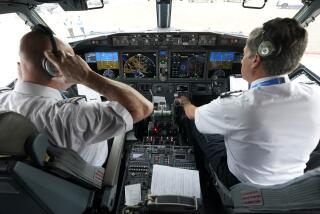Pilots Face Suspension Under FAA Proposal : FAA: New Proposals
- Share via
Protection from pilots convicted of drunk driving and from fuel-tank explosions in airplane crashes are the goals of two new programs by the Federal Aviation Administration.
The FAA is seeking authority to suspend or revoke licenses of pilots found driving automobiles while under the influence of alcohol or drugs.
The potential problem is larger than one might imagine. In a 1987 review of “National Driver Register” medical records, the FAA found that the driver’s licenses of more than 10,000 active pilots had been suspended or revoked for drunk driving during the previous seven years.
Moreover, more than 75% of that number didn’t report the convictions to the FAA as required.
Under the FAA proposal, pilots would have their medical certificates (required to legally operate a plane) automatically voided in the event of a single alcohol- or drug-related driving offense.
Provide the Evidence
Pilots could later apply for reinstatement but would be required to provide the FAA with evidence that they had successfully completed an alcohol/substance-abuse treatment program.
In addition, pilots would risk losing their pilot’s licenses if records indicated two convictions involving alcohol/drug driving offenses over three years.
Pilots would be required to report such convictions within 60 days. Failure to do so would be grounds for losing a license.
As part of a general tightening of rules to ensure the safety of passengers (on trains and buses, as well as on planes), the Department of Transportation will start a random drug-testing program later this year, unless a court challenge prevents it.
About 4 million transportation employees with safety-related responsibilities will be required to participate in five kinds of drug testing: random, pre-employment, periodic, reasonable cause and post-accident. Tests will look for the presence of various substances, including marijuana and cocaine.
Transportation employees who test positive will be removed from their duties, and will only be reinstated with the approval of a medical officer following rehabilitation.
Separately, the FAA is investigating the feasibility of installing rupture-resistant fuel tanks and fuel lines in planes to reduce the risk of post-crash fires. The fuel lines would also be required to disconnect and self-seal in an accident.
This could eliminate or minimize fuel spillage in the fuselage area, which would reduce the chances for a post-crash fire and give surviving passengers more time to escape.
Survival after a plane crash depends in part upon how quickly passengers can get out of the aircraft. It also depends upon the length of time between the crash and a resulting fire or explosion in the cabin. Many passengers survive the crash only to die from fire and toxic fumes.
Among questions the FAA is studying is whether it is possible and makes economic and technological sense to design and install rupture-resistant fuselage fuel systems.
They also are interested in how much such changes would increase passenger safety.
The FAA looked into the possibility of developing standards for crash-resistant fuel tanks as far back as 1964, but dropped the program because technical data was lacking. Other safety measures were suggested, including new flammability standards for seat cushions and cabin materials, emergency escape-path signals on the cabin floors and additional smoke detectors and fire extinguishing systems.
Data Available
But after 25 years, observers believe there is enough technological data available to judge the feasibility and effectiveness of safer fuel tanks.
Deadline for comments on pilots with drunk-driving convictions is July 17. Comments on the crashworthy fuel tanks must be submitted by Oct. 30.
Send comments, including the docket numbers (25890 for crashworthy fuel tanks and 25905 for pilots) to the Federal Aviation Administration, 800 Independence Ave. S.W., Washington D.C. 20591.
More to Read
Sign up for Essential California
The most important California stories and recommendations in your inbox every morning.
You may occasionally receive promotional content from the Los Angeles Times.













